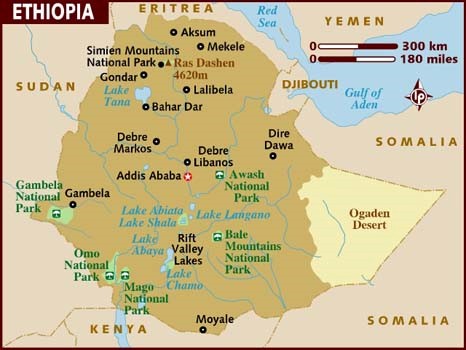Ethiopia’s next Prime Minister
March 28, 2018 | Expert Insights

Abiyyi Ahimad Alii has been elected by the ruling coalition as the Prime Minister delegate for Ethiopia. The region has witnessed many violent protests in recent years with the public expressing anger towards the governance.
Background
Ethiopia is a landlocked nation in eastern Africa, with a population of over 100 million: the second highest in Africa. Over 70% of the population is dependent on agriculture for livelihood and 80% of the population lives in rural areas.
Ethiopia avoided colonial rule until the 20th century, when it was invaded by fascist Italy in 1935. The occupation lasted 6 years. A revolt returned the former Emperor Selassie to power only to be overthrown by Soviet-backed dissidents in 1974. The Marxist Derg and its leader Colonel Mariam, who was responsible for the “red terror”, ruled for almost two decades, during which time the country saw severe droughts and famines.
In 1991, the Ethiopian People’s Revolutionary Democratic Front (EPRDF) captured the capital from the Derg. The Federal Democratic Republic of Ethiopia was formed. The EPRDF is Ethiopia’s current ruling coalition comprising of four parties: The Oromo Peoples’ Democratic Organization (OPDO), the Amhara National Democratic Movement (ANDM), the Southern Ethiopian People’s Democratic Movement (SEPDM), and the Tigrayan People’s Liberation Front (TPLF). The EPRDF has been accused of wrongful imprisonment of opposition, amongst other human rights violations.
Ethiopia has been home to growing unrest since 2014, when peaceful protests against a development project in Oromo were met with violence from the state. These protests grew into a call for political and economic reform, largely from the regions of Omoro and Amhara, whose people claimed a lack of representation. Hundreds of people were killed during these protests, and over 10 thousand arrested. A 10-month state of emergency was instituted in October 2016. A year later, protests erupted again, with a continued demand for political change and the release of political prisoners.

Analysis
Since January this year, the country has released over 6,000 political prisoners, including opposition leaders, protesters, and journalists, in an attempt to reduce dissent. However, protests have continued. Ethiopian Prime Minister Hailemariam Desalegn resigned on the 15th of February this year amongst growing political turmoil.
The region devolved into more chaos due to the resignation of Hailemarian and protests continued. The resignation also resulted in the government declaring a state of emergency in the region for a period of six months. In March 2018, the local media in Ethiopia confirmed that Abiyyi Ahimad Alii has been elected by the ruling coalition as the Prime Minister delegate. He is the chairman of the Ethiopian People's Revolutionary Democratic Front (EPRDF) and the current Chairman of OPDO (Oromo Peoples' Democratic Organization). He comes from the Oromo ethnic group.
Abiyyi Ahimad Alii is considered a reformer. During a recent meeting in the Oromia region he is believed to have said, “A fair justice system works only when human rights are respected.”In a 2016 interview with the AP, he spoke about the decline in good governance in the country that had prompted the protests. He said, “That (poor governance) is the main reason why people are protesting. This is really a positive sign. I have recently apologized in front of the parliament for our mismanagement and lack of responsibility that have generated these dissents. We are now taking measures to address those grievances.”
Yonas Alemayehu, an activist in the restive region, told The Associated Press, “I believe that Dr. Abiy Ahmed is the answer to Ethiopia's youths' questions.” However, not everyone is convinced that he will be able to usher in stability to the embattled region. Yilikal Getnet, a prominent opposition figure said, “This change in leadership is an indication of how unstable the government is. It has got nothing to do with opening up for democratization or a peaceful transfer of power. It's time for the ruling party to admit that solving Ethiopia's current woes are beyond its capacity."
Assessment
Our assessment is that Abiyyi Ahimad Ali will have to address the present crisis in the country while also holding together the coalition. These protests are rooted in ethnic differences, and it will be imperative to ensure that they do not spiral into ethnic conflict and violence.








Comments